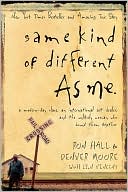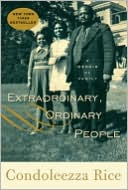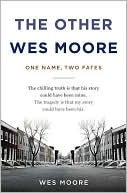Roots: The 30th Anniversary Edition
One of the most important books and television series ever to appear, Roots, galvanized the nation, and created an extraordinary political, racial, social and cultural dialogue that hadn’t been seen since the publication of Uncle Tom’s Cabin. The book sold over one million copies in the first year, and the miniseries was watched by an astonishing 130 million people. It also won both the Pulitzer Prize and the National Book Award. Roots opened up the minds of Americans of...
Search in google:
"Early in the spring of 1750, in the village of Juffure, four days upriver from the coast of The Gambia, West Africa, a man—child was born to Omoro and Binta Kinte." So begins Roots, one of the most important and influential books of our time. When originally published thirty years ago, it galvanized the nation and created an extraordinary political, racial, social, and cultural dialogue that had not been seen in this country since the publication of Uncle Tom's Cabin. Roots has lost none of its emotional power and drama, and its message for today's and future generations is even more vital and relevant than it was thirty years ago. When he was a boy in Henning, Tennessee, Alex Haley's grandmother used to tell him stories about their family-stories that went back to her grandparents, and their grandparents, down through the generations all the way to a man she called "the African." She said he had lived across the ocean near what he called the "Kamby Bolongo" and had been out in the forest one day chopping wood to make a drum when he was set upon by four men, beaten, chained and dragged aboard a slave ship bound for Colonial America. Still vividly remembering the stories after he grew up and became a writer, Haley began to search for documentation that might authenticate the narrative. It took ten years and a half a million miles of travel across continents to find it, but finally, in an astonishing feat of genealogical detective work, he discovered not only the name of "the African"-Kunta Kinte-but the precise location of Juffure, the very village in The Gambia, West Africa, from which he was abducted in 1767 at the age of sixteen and taken on the Lord Ligonier to Maryland and sold to a Virginia planter. Haley has talked in Juffure with his own African sixth cousins. On September 29, 1967, he stood on the dock in Annapolis where his great—great—great—great—grandfather was taken ashore on September 29, 1767. Now he has written the monumental two—century drama of Kunta Kinte and the six generations who came after him-slaves and freedmen, farmers and blacksmiths, lumber mill workers and Pullman porters, lawyers and architects-and one author. But Haley has done more than recapture the history of his own family. As the first black American writer to trace his origins back to their roots, he has told the story of 39 million Americans of African descent. He has rediscovered for an entire people a rich cultural heritage that slavery took away from them, along with their names and their identities. Roots speaks, finally, not just to blacks, or to whites, but to all peoples and all races everywhere, for the story it tells is one of the most eloquent testimonials ever written to the indomitability of the human spirit.Sacred LifeRoots is the fictionalized account of Alex Haley's family history and an epic narrative of the African American experience. For many African Americans, the novel and the history-making television miniseries it begot were pivotal in their understanding and appreciation of their origins. The story traces Haley's family history from the imagined birth of his ancestor Kant Kin in an African village in 1750 to the death, seven generations later, of his father in Arkansas. Based on fifteen years of research by Haley, the novel is a combination of fact and fiction—it is often referred to as faction—that puts a human face on the suffering of black people through the ordeal of the Middle Passage, slavery, and Jim Grow. Its combination of compelling, affectionate storytelling and informative history has had a revolutionary effect on the way Americans—black and white—think about the history of a people. The story, like that of Olaudah Equiano, begins in an idyllic African world destroyed by Europeans. Haley's description of Kinte's journey to America in the hold of a slave ship is harrowing and indelibly memorable. Kinte is enslaved in America but is still proud, refusing to forsake his African name or heritage. He passes on stories of Africa to his daughter, Kizzy, who bears a child, Chicken George. George is a successful cockfighter whose father is also his master—a common situation in the time of slavery but one that is treated with unusual sensitivity here. George passes the stories of his grandfather on to his children, including Tom, who marries a part-Indian woman named Irene. Tom and Irene have eight children, one of whom is Haley's grandmother. She passes the family stories to her daughter, who passes them on to Haley. Haley, in turn, tells the story, from Kunta Kinte to Chicken George, to his own grandmother, to his children. Haley has been accused of plagiarism and his book has been criticized for historical inaccuracies, but the novel holds up as a powerful representation of the full African American saga. Haley tells the story of his family—and, by extension, the story of all black people whose family histories are lost in the mists of time—with an immense amount of respect and tenderness. Amidst the undeniable misery of slavery and Jim Crow, he always reveals the outstanding characteristics that sustained his family—spirited resistance, cunning survival instincts, and a will to remember and pass on. James Baldwin captured the book's appeal when he wrote, "Alex Haley's taking us back through time to the village of his ancestors is an act of faith and courage, but this book is also an act of love, and it is this which makes it haunting."
\ Sacred LifeRoots is the fictionalized account of Alex Haley's family history and an epic narrative of the African American experience. For many African Americans, the novel and the history-making television miniseries it begot were pivotal in their understanding and appreciation of their origins. The story traces Haley's family history from the imagined birth of his ancestor Kant Kin in an African village in 1750 to the death, seven generations later, of his father in Arkansas. Based on fifteen years of research by Haley, the novel is a combination of fact and fiction—it is often referred to as faction—that puts a human face on the suffering of black people through the ordeal of the Middle Passage, slavery, and Jim Grow. Its combination of compelling, affectionate storytelling and informative history has had a revolutionary effect on the way Americans—black and white—think about the history of a people.\ The story, like that of Olaudah Equiano, begins in an idyllic African world destroyed by Europeans. Haley's description of Kinte's journey to America in the hold of a slave ship is harrowing and indelibly memorable. Kinte is enslaved in America but is still proud, refusing to forsake his African name or heritage. He passes on stories of Africa to his daughter, Kizzy, who bears a child, Chicken George. George is a successful cockfighter whose father is also his master—a common situation in the time of slavery but one that is treated with unusual sensitivity here. George passes the stories of his grandfather on to his children, including Tom, who marries a part-Indian woman named Irene. Tom and Irene have eight children, one of whom is Haley's grandmother. She passes the family stories to her daughter, who passes them on to Haley. Haley, in turn, tells the story, from Kunta Kinte to Chicken George, to his own grandmother, to his children.\ Haley has been accused of plagiarism and his book has been criticized for historical inaccuracies, but the novel holds up as a powerful representation of the full African American saga. Haley tells the story of his family—and, by extension, the story of all black people whose family histories are lost in the mists of time—with an immense amount of respect and tenderness. Amidst the undeniable misery of slavery and Jim Crow, he always reveals the outstanding characteristics that sustained his family—spirited resistance, cunning survival instincts, and a will to remember and pass on. James Baldwin captured the book's appeal when he wrote, "Alex Haley's taking us back through time to the village of his ancestors is an act of faith and courage, but this book is also an act of love, and it is this which makes it haunting."\ \ \ \ \ \ Publishers WeeklyIt's hard to believe that it has been 30 years since Alex Haley's groundbreaking historical novel (based on his own family's history) was first published and became a worldwide phenomenon. Millions have read the story of the young African boy named Kunte Kinte, who in the late 1700s was kidnapped from his homeland and brought to the United States as a slave. Haley follows Kunte Kinte's family line over the next seven generations, creating a moving historical novel spanning 200 years. Avery Brooks proves to be the perfect choice to bring Haley's devastatingly powerful piece of American literature to audio. Brooks's rich, deep baritone brings a deliberate, dignified, at times almost reverential interpretation to his reading, but never so reserved as to forget that at its heart this is a story about people and family. His multiple characterizations manage, with a smooth and accomplished ease, to capture the true essence of each individual in the book. Michael Eric Dyson offers an informative introduction to Haley's book, but it is Brooks's performance that brings the author's words and history to life. Simultaneous release with the Vanguard Press paperback reissue. (June)\ Copyright 2007 Reed Business Information\ \ \ Library JournalWhen Rootswas published in the mid-1970s, America was still in a period of introspection caused by all things Watergate and the bicentennial celebration. Haley's self-described "novelized amalgam" chronicled seven generations of his family, from West Africa to the United States and back. Roots-both the book and the groundbreaking TV miniseries that followed-became a cultural phenomenon. To commemorate the 30th anniversary, both the out-of-print book and unavailable video have been rereleased. Ironically, Haley's work, which had its genesis in stories deeply rooted and handed down through the African and African American oral tradition, has never been available on audio-until now. After the author's acknowledgments, the audiobook begins with "Haley's Comet," an introduction written and read by Georgetown University professor and cultural critic Michael Eric Dyson, who was a 17-year-old student at the height of Roots' popularity. It is a cursory essay that adds little to the presentation. Additionally, one might have expected the audiobook to be a multicast undertaking; however, actor Avery Brooks has the monumental task of narrating the entire project. His powerful baritone voice is-as necessary-forceful, evocative, scholarly, and descriptive. While he doesn't attempt to give each secondary character a distinctive voice, he infuses his reading with inflections that define their personalities. Recommended for all libraries. [Though listed as nonfiction on the cover, Rootsis generally considered historical fiction.-Ed.]\ —Gwendolyn Osborne\ \ \ \ \ \ Charles McGrath....Roots is a study of continuities, of consequences, of how a people perpetuate themselves, how each generation helps to doom, or helps to liberate, the coming one. -- The New York Times Books of the Century\ \








